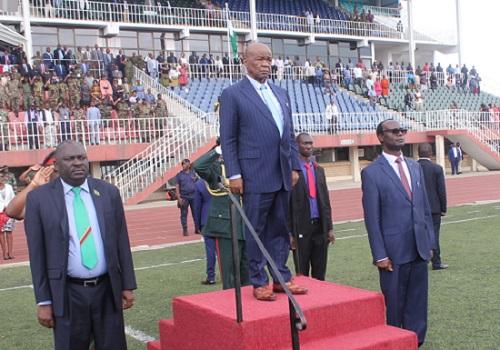The SADC Preventative Mission in the Kingdom of Lesotho (SAPMIL) officially closed office after one year's deployment in a ceremony held at Setsoto Stadium in Maseru, the Kingdom of Lesotho on the 20th November 2018.
Speaking during the occasion, the Right Honourable the Prime Minister, of the Kingdom of Lesotho, Dr Motsoahae Thomas Thabane when whilst thanking the entire SADC community for the support rendered to Lesotho, he noted that the commitment of the government of Lesotho to undertake inclusive and transparent reforms remains unshakeable. To that end, he observed that significant strides were made since the SAMPIL deployment. He explained that all stakeholders have pledged to support and participate in the reform process. Prime Minister Dr Thabane informed his audience that two episodes of the National Leaders Forum, comprising of all leaders of political parties and civil society have been held and this has paved way for the holding of the Multi-Stakeholder National Dialogue Planning Committee on the 26th to 28th November 2018.
The Minister of Defence of the Republic Zambia, Hon, Davies Chama, on behalf of the Chair of SADC Organ on Politics, Defence and Security Cooperation, His Excellency, Mr Edgar Chagwa Lungu President of the Republic of Zambia, explained that the purpose of SAPMIL mission was to create a secure, stable and peaceful environment, that is conducive for the implementation of security sector reforms and to implement SADC decisions. He said the successful completion of the mission showed the extent to which SADC Member States were committed to solving their own problems. Hon. Minister Davis shared with his audience that SAPMIL was deployed on 20th November 2017 in line with the Decision of the Double Troika Summit held on 15th September 2017 in Pretoria, South Africa.
In her remarks, the SADC Executive Secretary, Her Excellency, Dr Stergomena Lawrence Tax also noted that the SAPMIL has made good progress since its deployment in November 2017. She said the presence of SAPMIL and the conduct of confidence building patrols amongst others have acted as a deterrent and created a conducive environment for the reforms to take place.
Dr Tax observed that the political and security situation in Lesotho is now calm, and there is steadfast improvement in the working relations amongst the stakeholders. She said the National Security Forum has been established, and weapons which were seized from the Lesotho Mountain Police during the 2014 raids were returned. To this end, the SAPMIL has been able to support the Kingdom of Lesotho in the re-training of its personnel, especially within the area of Civil Military Relation (CIMIC), International Conflict Management, and the capacitation of 400 Military personnel, Police, Correctional Services and Intelligence branches.
Dr Tax said, in relation to the National Dialogue, SAPMIL has assisted in the signing of a framework document by key Basotho stakeholders known as the "Framework Document to Facilitate the National Dialogue Process in the Kingdom of Lesotho". She reminded all Basotho that they have the responsibility to ensure that they adhere to the framework document without compromise. She further assured that through the Oversight Committee, headed by Retired Chief Justice Matthew Ngulube, from the Republic of Zambia, SADC will continue to monitor and act as an early warning mechanism, and support Lesotho reconciliatory process, while on the other hand, the Facilitator, His Excellency, Cyril Ramaphosa and his team, will continue to facilitate the National Dialogue and reforms process.
The SAPMIL Closing Down Ceremony and Medal Parade was also attended by Deputy Prime Minister of Namibia & Minister of International Relations and Co-operation, H.E. Netumbo Nandi-Ndaitwah, representing the Chair of SADC, Minister of Defence and Veterans for the Republic of South Africa, Hon. Nosiviwe Noluthando Mapisa-Nqakula, who represented the Facilitator for Lesotho peace process and President of the Republic of South Africa, Retired Chief Justice Matthew Ngulube, members of the Diplomatic Corps, Defence and Security Chiefs and Senior Government Officials.

